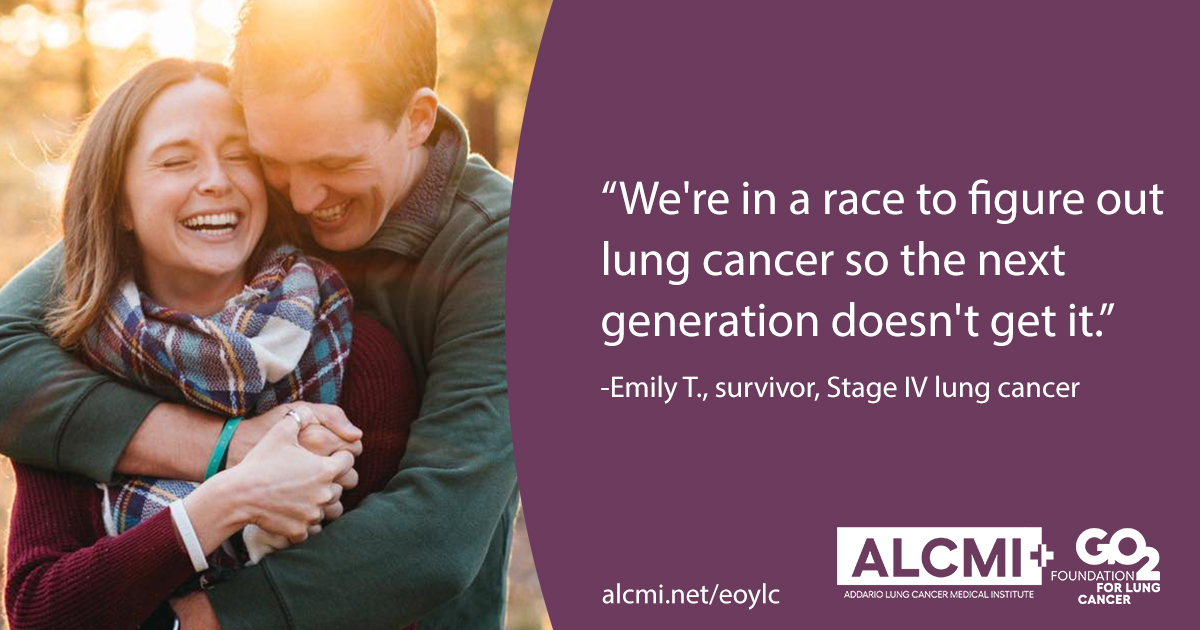
GO2 for Lung Cancer and the Addario Lung Cancer Medical Institute (ALCMI) recently launched a new study, Epidemiology of Young Lung Cancer (EoYLC), to better understand why some people under the age of 40 develop lung cancer. Many of them have no history of smoking.
The new study builds on the findings of an earlier one. In ALCMI conducted an award-winning study called the Genomics of Young Lung Cancer (GoYLC), led by leading thoracic oncologists Drs. Barbara Gitlitz and Geoff Oxnard. The GoYLC study, published in 2016, found that nearly 84%1 of participants with lung adenocarcinoma had specific gene changes that can be treated with targeted therapies or precision medicine. This rate of genetic mutation is much higher than that seen in the general lung cancer population. This leads to the question, “Why are these young, healthy individuals developing this type of lung cancer?”
Epidemiology of Young Lung Cancer seeks to answer this question by looking for possible clues from environmental and childhood exposures and other potential risk factors. The EoYLC study is being led by Drs. Jorge Nieva and Barbara Gitlitz and will survey at least 250 patients diagnosed with lung cancer before age 40. Patients will answer a confidential survey about their medical history, demographics, exposures, and other lifestyle questions. Participants will also provide a small sample of blood for additional biological studies.
The goal of the EOYLC study is to begin to identify underlying signals of developing young lung cancer. Recent data presented at the 2020 World Conference on Lung Cancer point to the role family history may play. In terms of environmental exposures, radon is known to play a role in lung cancer and air pollution also warrants further investigation.
EOYLC is a key step in GO2 for Lung Cancer and ALCMI’s efforts to understand the drivers of lung cancer. This study has the potential to reveal insights across several mutations, including EGFR, ALK, ROS1, KRAS and others. We will work closely with the biomarker patient group community, including ALK Fusion, ALK Positive, EGFR Resisters, KRAS Kickers, ROS1ders and others to increase awareness of this study opportunity. This work promises to lay a foundation for future expansion to international patient groups. It could also uncover insights in oncogene-driven lung cancer that warrant further investigation in other tumor types.
There is also interest in hormonal influences – including among women of child-bearing age and post-menopausal women. Of note, the incidence of lung cancer in young women is on the rise, and GO2 for Lung Cancer is launching a multipronged effort to address this. Research, including the EoYLC study, is one track. Supporting new federal legislation is another.
The EOYLC study is open to anyone in the United States who has been diagnosed with non-small cell lung cancer before age 40. Click here to learn more or to sign up.
1 Gitlitz B, et al. The Genomics of Young Lung Cancer: Comprehensive Tissue Genomic Analysis in Patients Under 40 with Lung Cancer. Submitted.

Leave A Comment